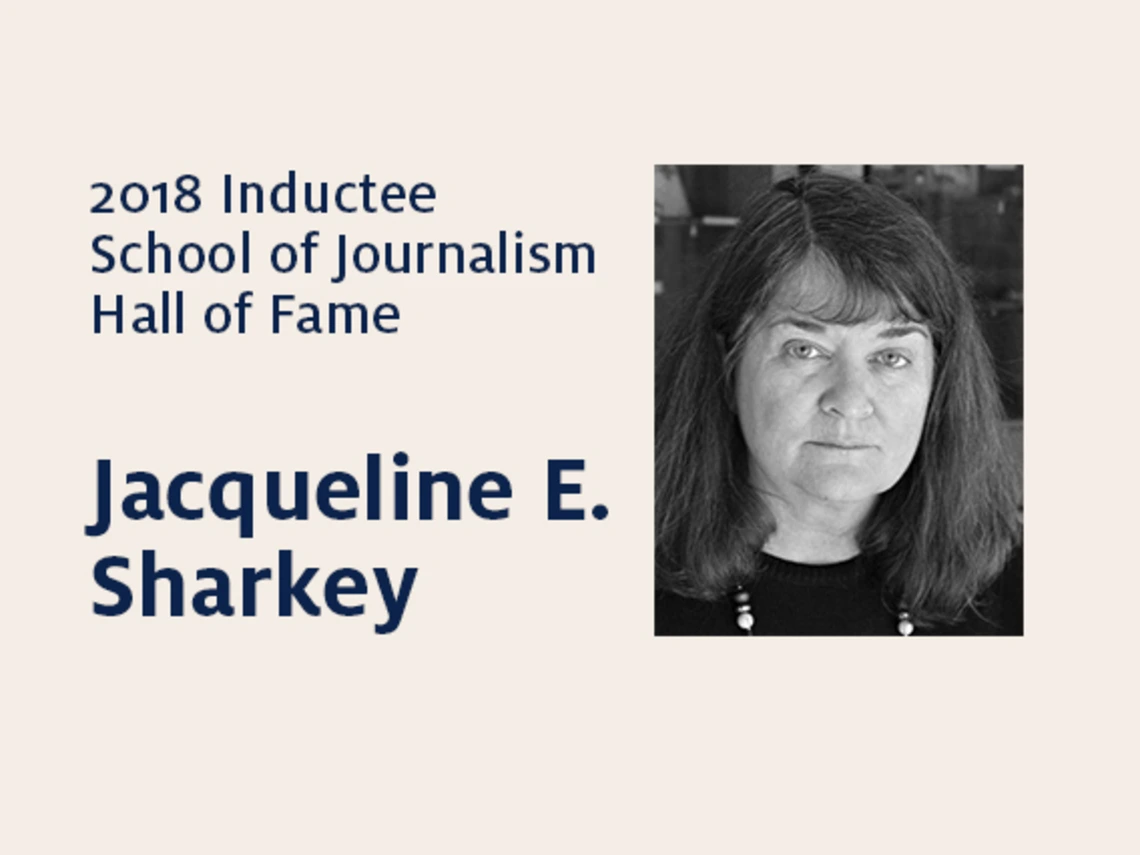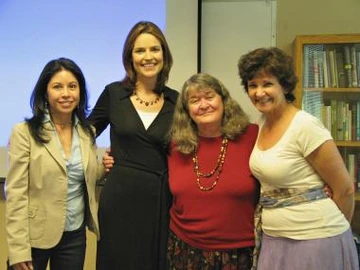Jacqueline E. Sharkey: 2018 Hall of Fame inductee

With outstanding vision and leadership, Jacqueline Sharkey transformed a mostly practical journalism program into one that not only excels in academic research but also thrives with cutting-edge student programs.
During fiscally tight times, when few campus units could expand, Sharkey grew student enrollment and doubled the size of the faculty as it became the School of Journalism in 2008. The graduate program was resurrected, and important emphases on global and science journalism were established.

The first woman to serve as director in the program’s 60-plus-year history, she oversaw the design and construction of new space in the Marshall Building, which enabled the department to move from the biohazard-filled Franklin Building in fall 2004. She built donations to provide for modern technology and computer labs well into the future, and solved fiscal problems with undergraduate fees.
“Through what can only be described as administrative door-to-door combat, Professor Sharkey gained precious ground for the program,” said Michael Chihak (’71) when she stepped down in 2011, "securing a professorship here, a major scholarship or other contribution there, slowly but surely building the program into the powerhouse that it is today.”
The 1972 grad was known for her excellence in teaching before becoming director. She created El Independiente in 1976, ahead of its time nationally for covering underserved, minority communities. The bilingual newspaper, which is now a magazine, focused on presenting in-depth public-affairs and investigative reporting on political, economic and social issues affecting South Tucson.
"For many years the newspaper was the only bilingual publication in the country produced on a regular basis by students to serve a real community," she said. "Staffers went on to work for major news organizations around the country, and won awards for their investigative work."
Some students remember her thorough and inspiring approach to photojournalism; other generations of students were deeply affected by her journalism ethics curriculum, recognized nationally when few schools were teaching the subject. As a teacher, she won the Freedom Forum National Journalism Teacher of the Year award.
Sharkey was a dedicated administrator and teacher, but she had a significant journalism career.
She reported on Latin American insurgencies, including leading coverage of the Iran-Contra scandal that contributed to congressonal investigations. She worked at The Washington Post as a copy editor, and she wrote a book that was an exhaustive treatment of the Pentagon’s press restrictions. As a journalist, she won awards from the Investigative Reporters and Editors, Overseas Press Club and Society of Professional Journalists.
Sharkey worked with faculty, staff and students on the successful reaccreditation of the department, and the successful outcome of its first Academic Program Review.
She developed interdisciplinary master's degrees with Latin American Studies, Middle Eastern and North African Studies, and the Department of Soil, Water, and Environmental Science. She also initiated the Science and Environmental Journalism program, which included working with colleagues in the journalism school and the Institute for Planet Earth (which became part of the Institute of the Environment).
Finally, she worked with the faculty and New York Times staff to bring the New York Times Student Journalism Institute to UA.
– Professor Susan Knight, ’87
JACQUELINE SHARKEY:
IN HER WORDS
On the school's strengths: "Most faculty have extensive experience in the field ... (which) enables them to bring both theory and practice into the classroom, and enables students to become critical thinkers. ...
"The curriculum emphasizes providing students with real-world experience from their first reporting class through the student-produced media they work for in advanced classes. These news media serve real communities, and students are accountable to the people there. The school also emphasizes internships, which provide additional opportunities for students to gain newsroom experience.
"The school's alumni provide a professional network for assisting students with finding appropriate internships and jobs that match the students' experience and aspirations."
On the journalism industry and its future: "Journalism is a cornerstone of democracy. The founders of this country supported the First Amendment to ensure that the people had access to independent, comprehensive information about their government, so they could make informed decisions at the ballot box.
"This role has not changed, although journalism now faces new challenges because of the revolution in communication technologies. This makes it imperative that the UA School of Journalism continue to emphasize critical thinking skills as well as technical skills, so its graduates can become news media leaders who can assist the profession in meeting these challenges."

